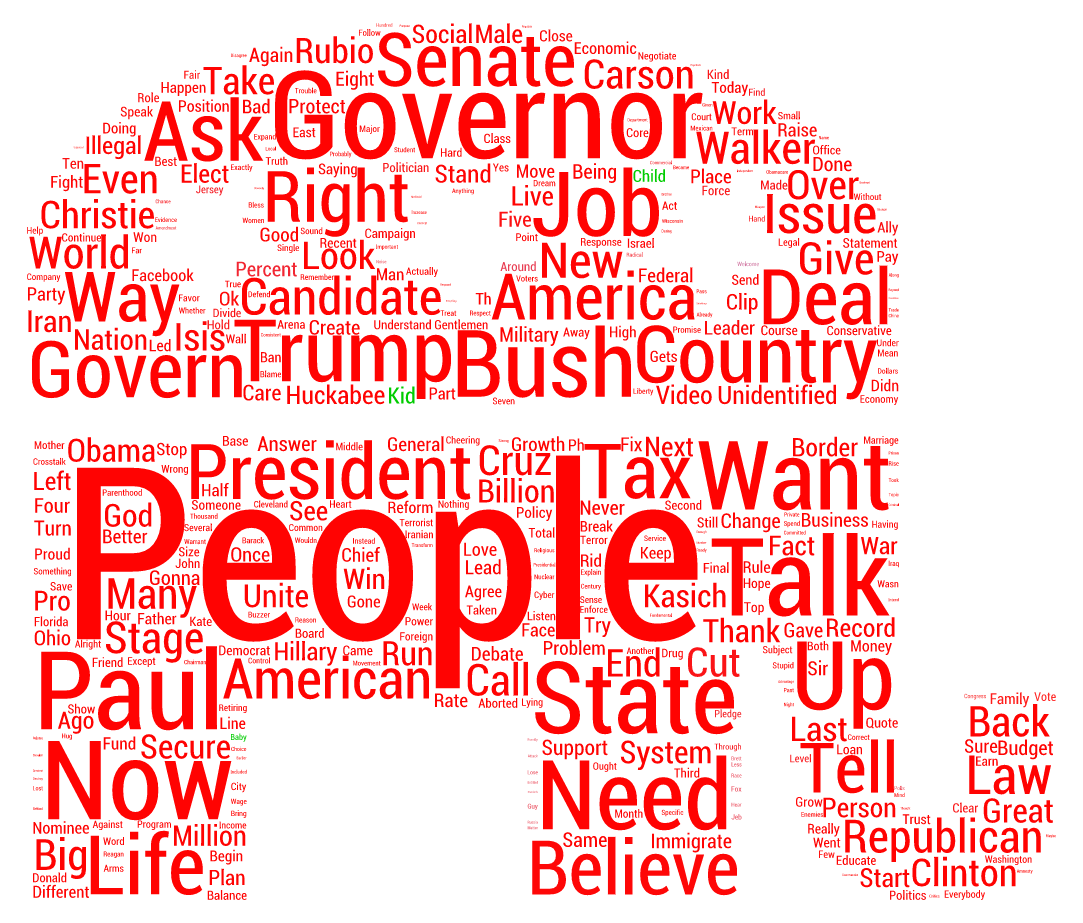Last week’s Republican presidential primary debate covered a lot of ground. I wondered how mentions of children compared with other issues. Here’s what I learned.
This debate featured 10 candidates whose campaigns generated the greatest support in an average of recent polls. An earlier debate featured seven candidates who did not meet Fox’s qualifications for the primetime debate. Participants (in order of Fox’s assessment of their polling data) in the primetime debate included real estate executive Donald Trump, former Florida Gov. Jeb Bush, Wisconsin Gov. Scott Walker, former Arkansas Gov. Mike Huckabee, retired neurosurgeon Ben Carson, Sen. Ted Cruz (Texas), Sen. Marco Rubio (Florida), Sen. Rand Paul (Kentucky), New Jersey Gov. Chris Christie, and Ohio Gov. John Kasich.
During the debate, the word “child” was spoken 10 times. Add “kid,” “baby,” “son,” and “daughter,” and the count goes up to a total of 30. That’s not bad, placing combined references to children above words like “conservative” and “Washington.” But it’s notable that candidates used “child” less frequently than words pertaining to other public policy issues, like “war” (14), “Iran” (19), “business” (19), and “border” (20).
The image below illustrates how references to children compared to other words used commonly during the primetime debate.
When you scan the transcript for references to specific policies, the results are also interesting. “Education” was a bright spot, with 10 mentions. Add four occurrences of “school,” and the issue got appreciable attention during the debate. But besides education, specific children’s issues did not fare as well.
The Children’s Health Insurance Program was not mentioned during the debate, but there were five references to Medicare and five references to “Obamacare.” Medicaid came up five times, but with no mention of children, despite the fact that Medicaid provides health care for more children than any other form of health insurance.
Tax policy is critical for children, accounting for 40 percent of all federal investments in kids. And tax policy received significant attention during the debate, with 30 mentions of “tax,” “taxes,” “taxpayers,” and related terms. But no mentions of the Earned Income Tax Credit or the Child Tax Credit, which together lift more than five million children out of poverty.
And speaking of poverty, it’s a huge children’s issue. The latest data (2013) shows a child poverty rate in America (19.9 percent) well above the poverty rate for adults 18-64 (13.6 percent) and more than double the poverty rate for seniors (9.5 percent). There were three references to poverty during the debate: one reference to increased poverty in general, one to poverty in the Middle East, and one to poverty among seniors.
Child abuse and neglect was not mentioned during the debate at all.
A First Focus Campaign for Children poll just before the 2012 presidential election found that nearly two-thirds of voters wanted candidates to focus more on children’s issues. And more than 80 percent said they’d consider a candidate’s position on federal funding for children’s initiatives when casting their ballots.
Voters clearly want to know how candidates stand on children’s issues, and they want campaigns that make children a focus, not an afterthought. Candidates – and the journalists who moderate candidate debates, conduct endorsement interviews, and ask questions on the campaign trail – should give voters what they want.
By the Numbers: Kids in the GOP Presidential Debate >> bit.ly/1HLN0jF v/ @First_Focus #InvestInKids pic.twitter.com/Lh1ayFk2kc
![]() Tweet this now.
Tweet this now.
Want to learn more? First Focus is a bipartisan advocacy organization dedicated to making children and families the priority in federal policy and budget decisions.
Want to get involved? You can support our work by making a donation, joining our mailing list to receive updates and action alerts.
